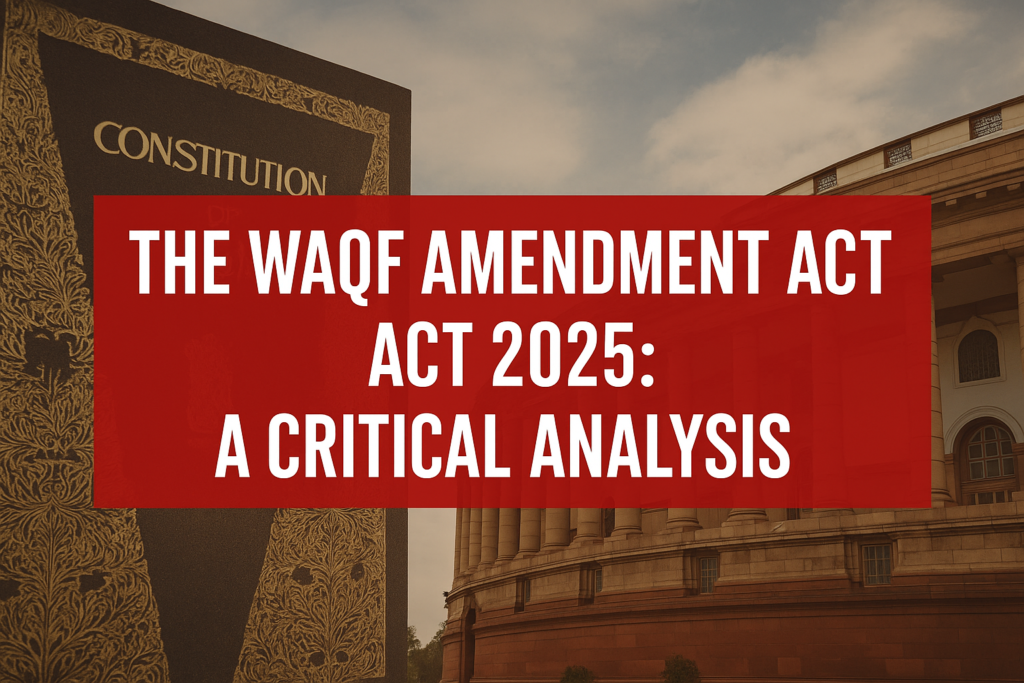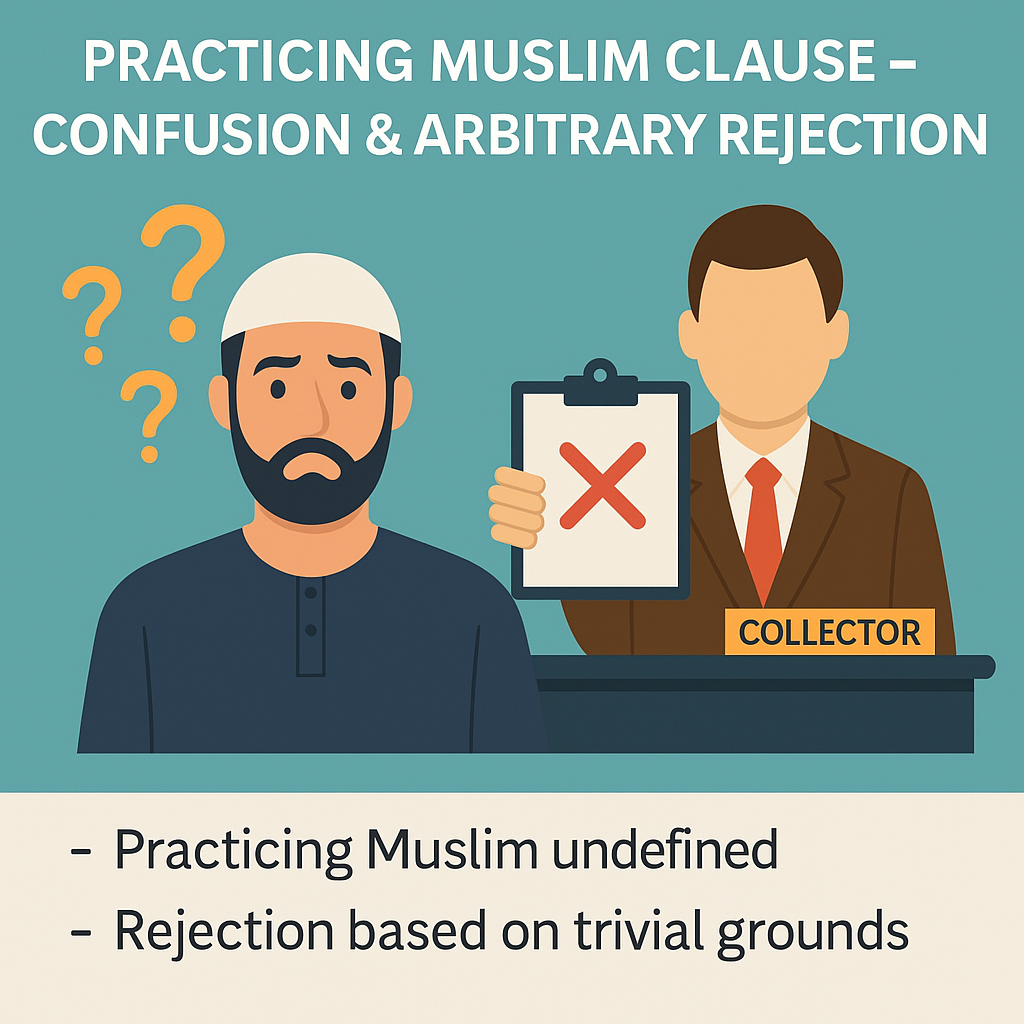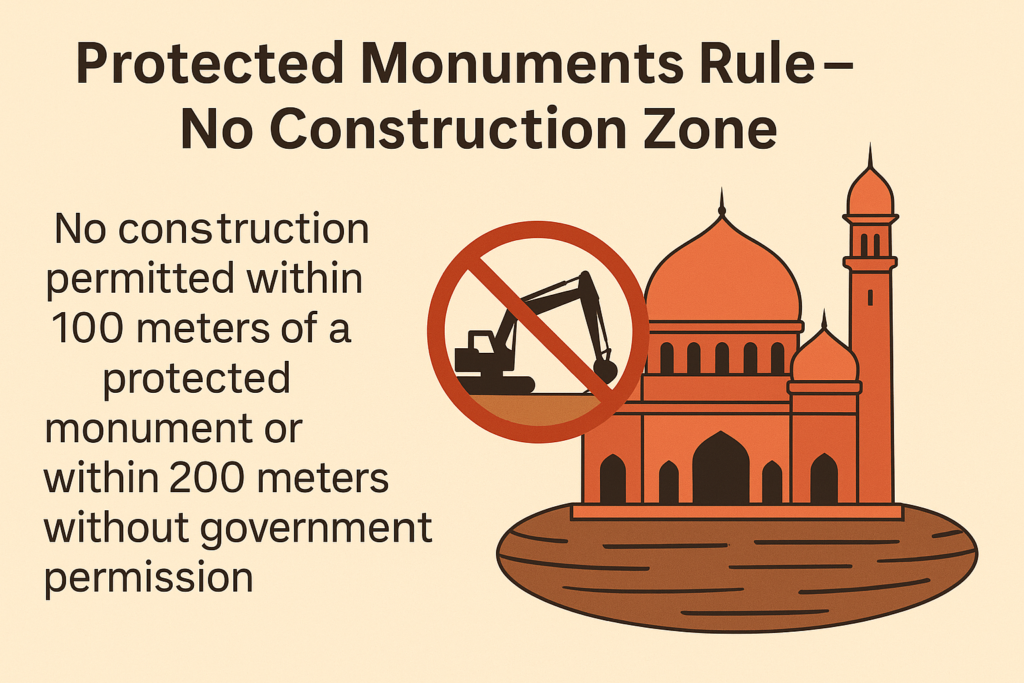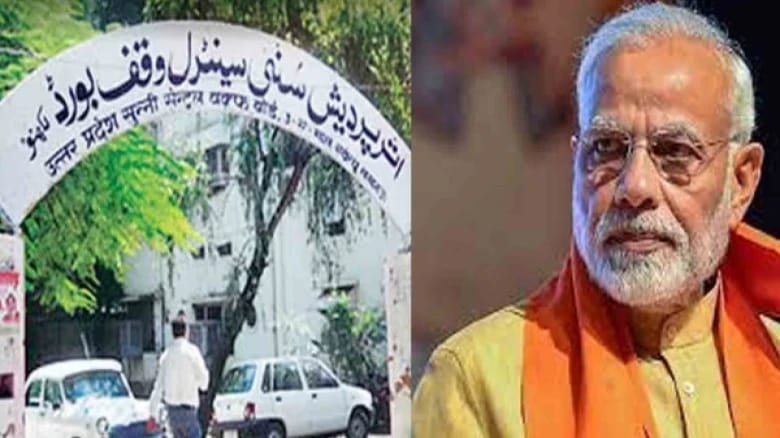The Modi Government, through significant changes to the old Waqf Amendment Law, has introduced the “Waqf Amendment Act 2025.” From its inception, this law has faced strong opposition across India, with critics arguing that it is unconstitutional and discriminatory. This article explores the key provisions of the new law, their implications, and why widespread protests are ongoing.

Key Provisions and Their Implications:
Waqf by User:
Waqf by User” refers to the concept where ancient religious sites — like the Tirupati Balaji Temple, Somnath Temple, and many other centuries-old temples — are recognized as temples even if they lack documentary evidence, because Hindu religious rituals, customs, and worship have been continuously practiced there for hundreds of years.
Similarly, historical mosques, shrines (dargahs), madrasas, mausoleums, and graveyards — even if they lack documentation — are recognized based on the fact that Islamic practices like prayers, burials, and rituals have been consistently performed there for generations.
Now, an allegation is often made that Muslims bury a body anywhere and declare the place as a dargah, graveyard, or mosque, and that the Waqf Board then claims the property under “Waqf by User.”
However, this allegation is completely false.
Islam strictly prohibits building a mosque, shrine, or graveyard by illegally occupying someone else’s land. Such actions are against the fundamental principles of Islam.
Still, based on these very allegations, the Modi government first removed ‘Waqf by User’ from the Waqf Act.
When heavy opposition arose, they added it back into the law — but with two major conditions, making “Waqf by User” practically ineffective under the new “Waqf Amendment Act 2025”:
First condition: If the government claims ownership of a Waqf property, “Waqf by User” will not apply.
Second condition: If there is even the slightest dispute — even over an inch of Waqf property — “Waqf by User” will not apply.
Even if someone plants a flag on a Waqf property or claims a mosque to be a temple, it will invalidate the Waqf by User claim.
Clearly, with these two conditions, the very essence of ‘Waqf by User’ is rendered meaningless.
In one stroke, all historic mosques, madrasas, shrines, mausoleums, graveyards, and Eid grounds could become disputed and slip out of Muslim hands.
Another accusation often made by BJP and Sangh groups is that the Waqf Board simply lays claim over any land or property it desires.
This too is a complete lie.
A Waqf property is only one that an individual has legitimately donated out of their own ownership for the sake of Allah.
If the Waqf Board suspects unauthorized occupation of its land, or if it lays claim to a property:
A high-ranking government officer, a land/property registry officer, a revenue department official, and a circle officer conduct investigations.
Only after thorough verification is an official gazette notification issued.
For one year, objections can be filed against the claim.
If no objection arises within that period, the property is accepted as Waqf property.
If someone objects, the case moves to a Waqf Tribunal.
If the tribunal rules in favor of the Waqf Board, the objector can go to the High Court, and then to the Supreme Court if necessary.
Only if the Supreme Court rules in favor of the Waqf Board does the property finally become officially Waqf property.
Thus, it is a long, multi-stage legal process —
Simply pointing a finger, claiming, or touching a property does not make it Waqf property!
Waqf al-Aulad;
According to the Waqf Amendment Act 2025, before making a “Waqf al-Aulad” (a family endowment), the donor (Waqif) must first fulfill the rights of all his heirs.
In Islam, it is already prescribed that a person cannot donate more than one-third of their property without the consent of their heirs.
However, this new law says that this is not enough — the government will now investigate whether the Waqif has properly settled the rights of his relatives and heirs.
If even one relative or heir claims that they have not received their rightful share, then the Waqif will no longer be allowed to dedicate even his own property to Waqf.
In simple terms:
If a person sells his property, the government has no problem —
Whether he invests the money in business, wastes it in gambling, or spends it on alcohol, the government does not intervene.
But, the moment a person decides to donate his property for the benefit of Muslims and for the sake of Allah, the government steps in to investigate whether he deprived his relatives or heirs of their rights!
Moreover, the law further states that even while the Waqif is alive, if any relative, heir, or any other person objects to the Waqf, the Waqif will not be allowed to dedicate his own property.
In short:
The law makes it extremely difficult for a person to donate his own property as Waqf, and effectively blocks and discourages the practice of Waqf altogether.
The Waqif Must Be a Practicing Muslim for Five Years:

Under the old law, any person — even a non-Muslim — could dedicate property as Waqf.
But according to the new Waqf Amendment Act 2025,
“The Waqif must have been a practicing Muslim for at least five years, and must be visibly seen as a practicing Muslim.”
The decision of who qualifies as a practicing Muslim will be made by the District Collector.
The mischief here is that the law does not clearly define what exactly constitutes a “practicing Muslim.”
There is no written explanation of how one will be recognized as a practicing Muslim.
This opens dangerous possibilities:
The Collector could exclude someone from being considered a practicing Muslim just for missing a single prayer or a single fast over five years.
Will a clean-shaven Muslim be considered practicing, or only one with a beard and cap?
If a Muslim was forcibly made to chant slogans like “Jai Shri Ram” by a mob, will he still be considered a practicing Muslim?
Nothing is clarified.
This ambiguity gives wide discretion to authorities and opens the door to deny individuals the right to dedicate their own property as Waqf.
In essence:
It makes the process of creating a Waqf almost impossible, effectively obstructing the spirit of Waqf.
Decision-Making Power Given to Collector and Senior Government Officials:
In disputed matters, the power to decide has been given to the Collector or a senior government officer of equivalent rank.
This is against the principle of natural justice.
For example:
If you claim that something belongs to you and then ask your own son to testify that it is yours, would that be considered fair and transparent justice?
Certainly not!
Similarly, how can it be considered fair to assign the decision-making authority in disputes to an officer who is himself part of the government, which may be a party to the dispute?
The law further states that the government officer will not make a decision based on personal opinion, but according to the law.
Sounds good, right?
But the problem is: Which law?
It is not specified.
This leaves room for arbitrary decisions by officials.
Under this new law:
If anyone makes a claim over a Waqf property —
Even just by submitting a simple letter to the Collector or District Magistrate —
From that moment, the property or land will be sealed, even if it was endowed as Waqf a hundred years ago.
The burden will then fall on the Waqf Board to prove ownership of the property.
Until the complete hearing of the case is done and a decision is given in favor of the Waqf Board,
the property will remain sealed.
Now, we all know how many years court cases can drag on in India!
For example:
Suppose there is an ancestral graveyard where your great-grandfather is buried.
Now your grandfather passes away, and you want to bury him in the same graveyard.
But you are not allowed to do so — because someone has made a claim over the graveyard, and it has been sealed.
In today’s atmosphere of rising hatred, it is highly likely that claims will be orchestrated on every graveyard, leading to decades of litigation, while the graveyards themselves remain sealed and inaccessible.
Protected Monuments:

The new Waqf Amendment Act 2025 states that any property or structure that the government declares as a Protected Monument will not be recognized as Waqf.
In one stroke, this move wipes out the status of all mosques, madrasas, graveyards, shrines, mausoleums, and Eid grounds that are over 100 years old.
Now, how will this happen? Let’s understand:
According to the law governing Protected Monuments:
Within a radius of 100 meters around a protected site, nothing new can be constructed.
In the next 200 meters beyond that, any activity or construction requires government permission.
And we all know — Muslims obtaining such government permissions will be extremely difficult in today’s environment.
Meaning:
Within a 300-meter radius around a protected monument, no construction or activity will be allowed.
For example:
Suppose there is a grave of a saint or elder.
People recognize the grave, and it is over 100 years old.
If the government declares it a protected monument,
The entire graveyard will be restricted.
No new burials can happen there.
No additional graves can be made.
No expansions will be permitted.
Effectively, the graveyard will become unusable.
Given that most graveyards are already over 100 years old, and almost every graveyard has at least one saint’s grave,
almost every Muslim graveyard will come under this rule and become paralyzed.
Further, the new law adds that:
In Northeastern states,
And certain central states like Jharkhand and Chhattisgarh,
And in areas like Jaipur,
If a region is declared as belonging to a Scheduled Tribe area (or is already listed as such),
then even if a property was endowed as Waqf over 1400 years ago,
it will not be recognized as Waqf anymore.
In other words:
All historic Waqf properties located in these regions and states will lose their Waqf status.
Application of the Limitation Act on Waqf Properties:
In India, there is a “Limitation Act” that applies to private properties.
Under this law:
If someone occupies a private property and the real owner does not send any legal notice within twelve years (the period may vary slightly from state to state),
The occupier is considered the rightful owner of the property.
However, the Limitation Act does not apply to government or public properties.
This means:
Even if someone illegally occupies government land and builds a house on it,
Even after 100 or 200 years, the land remains government property.
The government can clear it at any time with bulldozers.
Until now, Waqf properties, like government and public properties, were exempt from the Limitation Act.
No matter how many hundreds or thousands of years passed, Waqf properties remained Waqf properties.
The Waqf Board retained the right to remove illegal encroachments at any time.
But under the new “Waqf Amendment Act 2025,”
The Limitation Act will now apply to Waqf properties just like private properties.
Meanwhile:
Properties belonging to Hindu temple boards and boards of other religions will continue to remain exempt from the Limitation Act.
The law change applies only to Waqf properties.
The consequence:
Any Waqf property that has been under illegal occupation for at least twelve years
Will now be legally recognized as belonging to the occupier.
The occupier will become the new legal owner.
Currently, around 50% of Waqf properties are under illegal occupation —
With the government itself being the largest encroacher in many cases.
As a result:
All these Waqf properties will slip away from the Waqf Board’s control.
The Waqf Board will lose the right to reclaim its own encroached properties.
Evacuee Properties:
Muslims used to dedicate their properties as Waqf even before 1947, and continued doing so after 1947.
During the Partition of India,
Some Muslims sold their properties at throwaway prices to Hindus before migrating to Pakistan.
Many Muslims, however, left for Pakistan without selling their properties, abandoning them.
The properties left behind by Muslims who migrated to Pakistan were brought under government control —
First under the Evacuee Property Act of 1950,
Later under the Enemy Property Act of 1968,
and were recognized as government properties.
The government accepted that:
Properties sold by Muslims before migrating would remain with the Hindu buyers,
And the government would not seize those properties.
However, the government also treated properties dedicated as Waqf before migration as evacuee properties under the Evacuee and Enemy Acts —
which was a gross injustice.
When the Muslim community realized this injustice, they initiated negotiations with the government.
The government asked them to submit applications for the properties that had been dedicated as Waqf before migration.
This was an extremely difficult task,
Still, applications were submitted for many properties, though many remained without applications.
For the properties where applications were filed:
The then Congress government agreed to return those properties to the Muslim community.
However, Congress engaged in political mischief:
Instead of giving it the rightful title of “Return of Waqf Properties to the Waqf Board,”
They called it “Provision related to Waqf Properties.”
This misnaming led to false propaganda by the Bharatiya Janata Party (BJP) and Sangh Parivar:
They claimed that the Congress government gave away all properties of Muslims who had migrated to Pakistan to the Waqf Board.
The truth is very different:
Only those properties were returned to the Waqf Board,
That were dedicated as Waqf before migration,
For which applications had been submitted,
And which, after proper verification, were recognized as genuine Waqf properties.
Now, under the new Waqf Amendment Act 2025:
The government is declaring that it will no longer recognize even those properties.
Even if the Waqf was created before migration,
Such properties will now be deemed government property, not Waqf property!
This is the main issue behind the ongoing controversy in Delhi,
where the government plans to easily seize 123 mosques and Waqf properties,
a move long demanded by BJP activists and leaders.
Properties Will Cease to Be Waqf If a Trust Is Formed:
According to the Waqf Amendment Act 2025,
If a trust is formed over any property,
That property will no longer be considered Waqf property.
At first glance, this seems reasonable:
If schools, madrasas, orphanages, or organizational offices are built on Waqf land,
Naturally, trusts would be created to manage them.
Even if these properties are not counted as Waqf under the new law,
There would appear to be no major cause for concern,
because these properties would still be serving the original Waqf purpose.
However, a real problem arises when we look at examples like Bihar:
In Bihar, around 3,900 madrasas built on Waqf land joined the government’s Madrasa Board.
To join the Madrasa Board, the government required them to form trusts.
Only after forming a trust were they allowed to register under the Board.
At the time,
There was no reason for alarm,
Since the madrasas were still fulfilling religious and educational goals in line with the original Waqf purpose.
But now, under the new law:
Any Waqf property over which a trust has been formed (or will be formed)
Will not be considered Waqf anymore.
Meaning:
Those 3,900 madrasas will now slip out of the hands of the Waqf Board.
Moreover:
The Madrasa Board is a government-run institution,
So effectively, these madrasas would come under government control,
severing their link with the Waqf system.
These were some of the major points that needed to be highlighted.
There are also many smaller but important points, including:
Under the new law,
the time limit for challenging the registration of Waqf properties has been increased from one year to two years.
Even after two years, if someone believes that a property is not Waqf, they can file a case in the Tribunal,
and the property can be put on hold for another two years during the proceedings.
The government will now have direct influence in the appointment of members to the Waqf Boards and the Central Waqf Council.
Moreover, non-Muslims can also be appointed to these bodies.
This will further erode the already limited autonomy of Waqf institutions.
Another new provision:
The central government has now been given the power to impose taxes on the income generated from Waqf properties.
The government can impose as much tax as it wants, and no one will be able to challenge it.
A particularly important point concerns a common myth:
It is often claimed that:
“After Defense and Railways, Muslim Waqf Boards hold the most land in India.”
This is completely false.
This false narrative is deliberately spread by Sangh-affiliated groups
to spread hatred and portray Muslims as a threat,
creating a perception as if there is a “State within a State” or a “Country within a Country.”
It is a vile and baseless accusation.
Imagine if someone said:
“The Indian Military is a Country within a Country.”
How absurd, offensive, and ridiculous would that sound?
The same kind of malicious propaganda is directed toward the Waqf Board.
Regarding the claim of holding the most land:
The complete categorization and classification of Waqf properties has never been done.
According to the Sachar Committee Report,
Waqf properties were recorded as covering around 600,000 acres.
Today, this figure is said to be over 900,000 acres,
and it may continue to grow.
However:
Even then, the Muslim Waqf Board does not rank third in land ownership in India.
For example:
In just two states — Andhra Pradesh and Tamil Nadu —
Hindu Temple Boards control around 940,000 acres of land.
If we extrapolate this across all states,
it is evident that Hindu Temple Boards hold many millions of acres of land —
likely more than Defense and Railways combined.
The new Waqf Amendment Act 2025 is in direct violation of Articles 25 and 26 of the Indian Constitution.
It prevents Muslims from freely practicing their religious affairs,
and strips the Waqf Board of rights and powers that remain intact for Hindu Temple Boards and other religious boards.
This black law establishes a system that:
Allows the government to seize Waqf properties arbitrarily,
Legalizes illegal encroachments on Waqf properties,
And prevents Muslims from carrying out religious activities tied to Waqf.
That is why there is strong opposition across India to the Waqf Amendment Act 2025 —
not just from Muslims,
but also from all political parties and social organizations
that are not allied with the Bharatiya Janata Party (BJP) or the Sangh Parivar.

- Associated Press. (2025, April 2). India’s Parliament Passes Bill That Would Change Muslim Land Endowments. AP News. https://apnews.com/article/4fb3ce70dbd2e579bccc43ce1e245f6d
- Reuters. (2025, April 2). New Indian Bill Proposes to Revamp Muslim Land Management, Faces Backlash. Reuters. https://www.reuters.com/world/india/new-indian-bill-proposes-revamp-muslim-land-management-faces-backlash-2025-04-02/
- Wikipedia contributors. (2025, April). The Waqf (Amendment) Act, 2025. Wikipedia. https://en.wikipedia.org/wiki/The_Waqf_%28Amendment%29_Act%2C_2025
- Wikipedia contributors. (2025, April). Murshidabad Violence. Wikipedia. https://en.wikipedia.org/wiki/Murshidabad_violence
- Wikipedia contributors. (2025, April). Imarat-e-Shariah. Wikipedia. https://en.wikipedia.org/wiki/Imarat-e-Shariah


